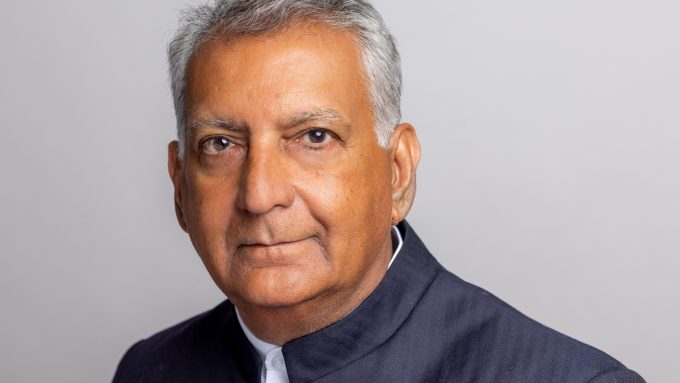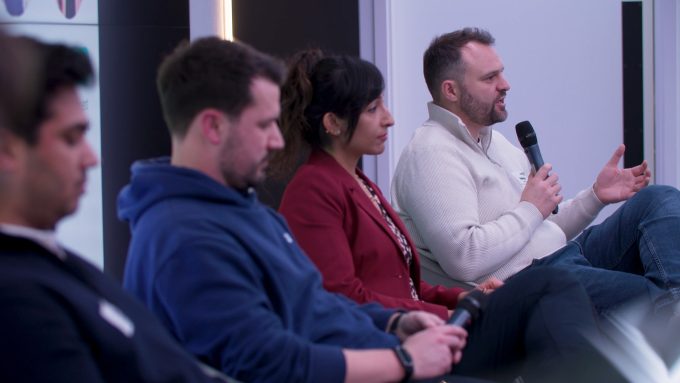
Meet the innovator bringing tech and transport together for rural commutes

Transport poverty is a large and growing problem outside of large towns and cities. Cuts to already infrequent bus services – or a lack of rail or tram routes – mean that many people in rural areas struggle to get around without access to their own car.
Step forward Tatseng Chiam, co-founder of shared transport platform RideTandem, which has provided over two million journeys for workers and students over the last five years using fleets of coaches, shuttle buses and taxis. In the process, over 16,000 tonnes of carbon emissions have been saved from being released into the atmosphere.
RideTandem works with clients to identify central pick-up points in local urban, peri-urban and semi-rural areas that a majority of passengers will be able to reach within a 10 minute walk. For those living further away, additional stops can be agreed. Passengers use their smartphones to book their seat and track progress of the approaching vehicle.
The service has proved popular with several large companies keen to help staff reach warehouses, offices or distribution centres in out-of-town locations; with many employers subsidising or paying the full cost of travel.
RideTandem has been supported twice in recent years by the Transport Research & Innovation Grants (TRIG) programme – delivered by Connected Places Catapult on behalf of the Department for Transport. Its first award in 2019 focused on accessible transport, and the second in 2023 was about local transport decarbonisation. Tatseng now has big plans to grow its offering to help more communities without a reliable public transport network stay mobile.
“Shared transportation represents a big market and offers a large social impact, because car ownership tends to be lowest among lower income households,” he says. “There is also a great environmental opportunity given that passenger transport is one of the most carbon intensive sectors.”
Seeing the need in both Rochdale and Brunei
An early indicator of the need for such a service came when Tatseng and his two co-founders Alex Shapland and Huw McLeod met a group of parents in Rochdale in Greater Manchester – an area which suffers from high levels of socio-economic deprivation. “This group had been out of work for several years because none of them could afford to drive,” he explains.
“The nearest public bus route had been cut several years ago, and the types of jobs they were seeking required them to be in work every day of the week, rather than at home. We came away thinking our proposal could be commercially successful.”
It also took Tatseng back several years to when he was living in Brunei in Southeast Asia, watching construction operatives walk more than an hour each day, alongside busy roads to get to and from work.
From an early age, Tatseng was exposed to an entrepreneurial spirit and the world of transport. Both sets of grandparents were business owners, running a restaurant and bakery, and his father set up Mercedez-Benz’ operations in Brunei.
“The ironic thing is that my business is all about transport, and yet I don’t have a driving licence myself,” he reflects. “But that may have helped me to empathise with our passenger base; many of whom don’t have a licence.”
At school, Tatseng developed his business acumen by sourcing cheap packs of Pokémon gaming cards from other countries and selling them to friends.

A rapid early career ascent
He won a scholarship to Sevenoaks School in Kent, and went on to read Politics Philosophy and Economics (PPE) at Oxford before entering the corporate world with the management consultant Deloitte in London and Dubai; getting involved in delivering strategic development projects in Saudi Arabia and Nigeria.
Tatseng went to America to join a business school and complete an MBA at the University of Pennsylvania. He then worked at Credit Suisse in New York in its renewable energy investment banking division, and later moved to London to join the Global Innovation Fund, focused on early-stage investment for firms that promise impact.
But despite a growing career in professional services, he was keen to follow in his family’s tradition and branch out himself. “Because I had so many entrepreneurial role models growing up, I always knew I wanted to make the leap at some point.
“As a child, I saw the joy and satisfaction one gets from building something from the ground up; but also that a lot of time, energy and financial investment goes into creating a business.”
Six years ago, Tatseng joined a company builder programme for entrepreneurs called Zinc, focused on creating commercial opportunity in areas such as sustainability and local renewal. It was, as he puts it, “bringing like-minded people together, in a sort of Love Island meets Dragons' Den meets The Apprentice way.”
Participants were encouraged to work with as many individuals as possible on different ideas; testing if personalities gelled and the mix of skills fitted. It was there he met Alex and Huw, and together they founded RideTandem.
“From day one, it was very clear we would be a very productive team. We were all motivated by wanting to create a business that not only has big commercial success, but also positive social and environmental impacts.”

Getting going on the ground
The trio started working to develop a passenger app featuring live tracking of services, a similar platform for drivers letting them know which route to take, and a dashboard for clients showing how many people are being served and the carbon savings achieved.
Tatseng and colleagues started working for an employment firm in Northamptonshire, arranging taxis for agency workers to get them to work from various locations outside Wellingborough. The next year RideTandem secured a contract with Royal Mail, followed by courier DPD, and today it has 25 clients across the UK. Beyond the technology, the company negotiates hire rates between clients and vehicle providers on anything from a four-seater taxi to an 85-seater coach.
Tatseng is grateful for Connected Places Catapult’s business support and networking opportunities offered through the TRIG programme, and says the first grant during the pandemic was particularly helpful; at what was a disruptive time for the transport sector.
“TRIG has been very useful for providing early-stage financing, that allowed us to take risks and experiment with ideas. Having an association with the Catapult and the Department for Transport also helps when having conversations; theirs are logos you are proud to put on a presentation to clients.”
The most recent grant is helping the company to develop machine learning and AI analytics for its platform. “We hope our system will be able to predict delays due to traffic or weather; it will make us more scalable as we continue to grow our operations.” This year the company is also looking to expand its operations to Germany.
Tatseng says being an entrepreneur involves “a lot of upfront pain, and a constant sense of uncertainty which never completely goes away. But five years into the journey, you start to feel a sense of satisfaction as the seeds you planted start to bloom.
“Back in 2019, there were just three of us; we're now a team of 45. For our first client we started transporting a few dozen passengers a day; we now transport thousands of passengers a day. There's a lot to be proud of.”
Find out more about the Transport Research and Innovation Grants programme.
Apply to attend our upcoming TRIG Showcase and Networking event in Birmingham (23 October) where Tatseng Chiam will be among participants on a panel discussion.





